People were spooked by what happened to the slave who bled to death, began to believe that even after two hundred years of doing it there might yet be a real science to cutting off ears, just as there was to hobbling a slave and butchering hogs in the fall. Promising good, efficient work and no dying, Oden had stepped forward after the death of the Amherst County slave, a twenty-seven-year-old left-handed man named Fred. Even after Oden took on the task, some masters continued to use the man’s death as a way to frighten possible runaways. “You mess up on me and you’ll get what that nigger Fred got. Then I’ll throw your damn carcass to the hogs.” That wasn’t true-hogs would eat just about anything, but Virginia hogs would never eat human beings. By Skiffington’s fourth year in office, Oden practically had a monopoly on ear cutting in some five counties, not including Manchester.
Luke slept beside Elias that Tuesday night after Oden cut off part of his ear. Luke knew a boy who had known Fred and he thought that if Elias should start bleeding during the night, he would be there to help him, could run fast enough to get Loretta before Elias lost all his blood. Elias told him at first that he didn’t want a soul near him and that he would kill him if the boy stayed. Luke said nothing and made his pallet a few inches from where Elias was chained up.
Caldonia and Loretta came in the barn before either the man or the boy went to sleep. Loretta removed Oden’s poultice and put on her own bandage, never saying a word during the whole time.
“Please, try to be good,” Caldonia said before leaving. “Please, try.” The two women had knelt down to Elias and Loretta had dropped Oden’s poultice in the straw and Caldonia had picked it up. There was not enough blood on it to worry about; one hour of her monthlies produced more. The smell of the pepper was strong. Caldonia said to Elias before standing up, “It is just as easy to do good as it is to do bad.” Elias stayed silent.
Caldonia looked down at Loretta tending to him and Luke looking at the man and the woman. All of it, every single bit of it, was a horrible mess. These were the times that made her want to rethink the road they were all going down. Such a long road for such a legacy, for slaves. “My legacy,” her mother Maude often said. “We must protect the legacy.”
Loretta stood and took the poultice from Caldonia. “I’ll see bout you in the mornin,” Loretta said. They left the barn and Caldonia told her to go on up to the house, that she wanted to visit a mite before retiring. She often visited the people in the lane, and some of them were ashamed to have her come into the cabins, knowing the miracle of the house she lived in. “I’ll come with you,” Loretta said. Caldonia shook her head. She said, “Tell your master I’ll be along directly.” Caldonia turned away and went to the lane. Where there was light seeping from under a door she knocked and knocked again until someone opened or asked, “Who that there? Who that comin to my door?”
Some two weeks later, another Sunday, after Moffett had come and preached and gone, Elias came upon Celeste holding Luke in her arms. They were near the fields and the boy was sobbing. She looked up and saw Elias and was not happy to see him, remembering the way he must have watched her limping about.
”Luke, boy, whas the matter with you?” Elias said. For a brief moment he thought Celeste may have slapped him and then regretted what she had done. But the way her arms engulfed the boy told him that she had done him no harm. His time with the boy had put Luke as close as any human being could be to the man’s heart. “Luke, boy, tell Elias whas wrong? Who hurt you? Tell Elias who it be?”
Celeste said, “I think he just missin his mama. A boy can miss his mama. A girl can miss her mama. I found him under that tree just cryin his heart out.” She did not want Elias the watcher man to come any closer to them but he did and he put his hand over the boy’s head and his hand was near one of her wrists. “Luke, I’ll be your mama,” she said. “I’ll be all the mama I can be for you.”
Soon, the boy quieted. Celeste looked at Elias’s hand and then up at him. There was a storm coming, which was why Elias had gone looking for Luke. The boy liked to play in the rain and never cared that lightning could kill him. The rain came now, a teasing kind of rain, soft, intermittent drops. A thirsty sparrow could have leaned its head back and enjoyed the drops without any fear of drowning. Celeste looked at a large drop of rain on the back of Elias’s hand covering Luke’s head, watched as the one drop was joined by two others. There was the sound of thunder but it was still far away, on the other side of the mountains. Celeste said, “We best get him out of this mess.” She managed to look the man in the face. “Yes, we best get him out of it.”
They, Celeste and Elias, continued to have next to nothing to say to each other after that and Elias went back to planning on running away. Late in the night, after Moses had assured Henry that Elias had learned his lesson, Elias would test the waters and go out to the road and wait to see what might descend on him.
When he began to care for Celeste, he would never be able to say, only that he awoke one morning to a quietness and stillness in the world he had never known before. The birds were not singing, the fire in the hearth did not crackle, the mice did not come and go, and even the snorers he shared the cabin with slept in silence. It was at such a time that he had always imagined he would slip away to freedom, a time when all the world had their heads turned the other way. But he sat up on his pallet and listened to the nothing and wanted to be with her. Slowly, the world seemed to come back to its senses and the first thing he thought he heard was the sound of her limping down the lane, the hem of her frock swishing along the ground, the foot of her bad leg scraping along in that second before she lifted it.
When he tried to get close to her, to walk a little bit beside her, hoping that closeness would say what he did not have words for, she would hurry away, believing he only wanted to see her life with a terrible limp. He hurt, day after day, to see her move away. Then, late one evening, almost two months after Oden took the razor to his ear, after all the work of the day and the slaves were in those moments when they set their minds to sleep, he came to the cabin she shared with two other women and Elias tapped until one of the women came to the door. Celeste had brought Luke to live with her, but he was not there.
“Could you mind tellin Celeste I’d like a word with her?” Elias said to the woman.
The woman laughed but when she saw he wasn’t going away, she turned and called to Celeste, “That Elias be wantin you.”
It seemed a long time before she came to the door. He nodded and she nodded back.
“I just wanted a word with you, thas all,” he said.
“All right,” she said.
He looked her full in the face, the light from inside the cabin silhouetting her. “Why you all the time treatin me bad when all I wanna do is treat you good?”
“What that you say?”
“Why you all the time treatin me bad when all I wanna do is treat you good? Thas what I said.”
“I ain’t think I was treatin you no kinda bad way.”
“Well, you was and all I’m askin is that you stop it.”
She put one hand on the doorjamb to steady herself to come down the one step to him and he took her by the other arm. She said after a minute or so, “I didn’t mean no harm by it.”
He believed her and was again without words. He found them when he heard one of the women inside the cabin laugh at something the other woman said. “I be talkin to you, then. Tomorrow if thas all right with you. I be talkin to you tomorrow.”
Читать дальше












